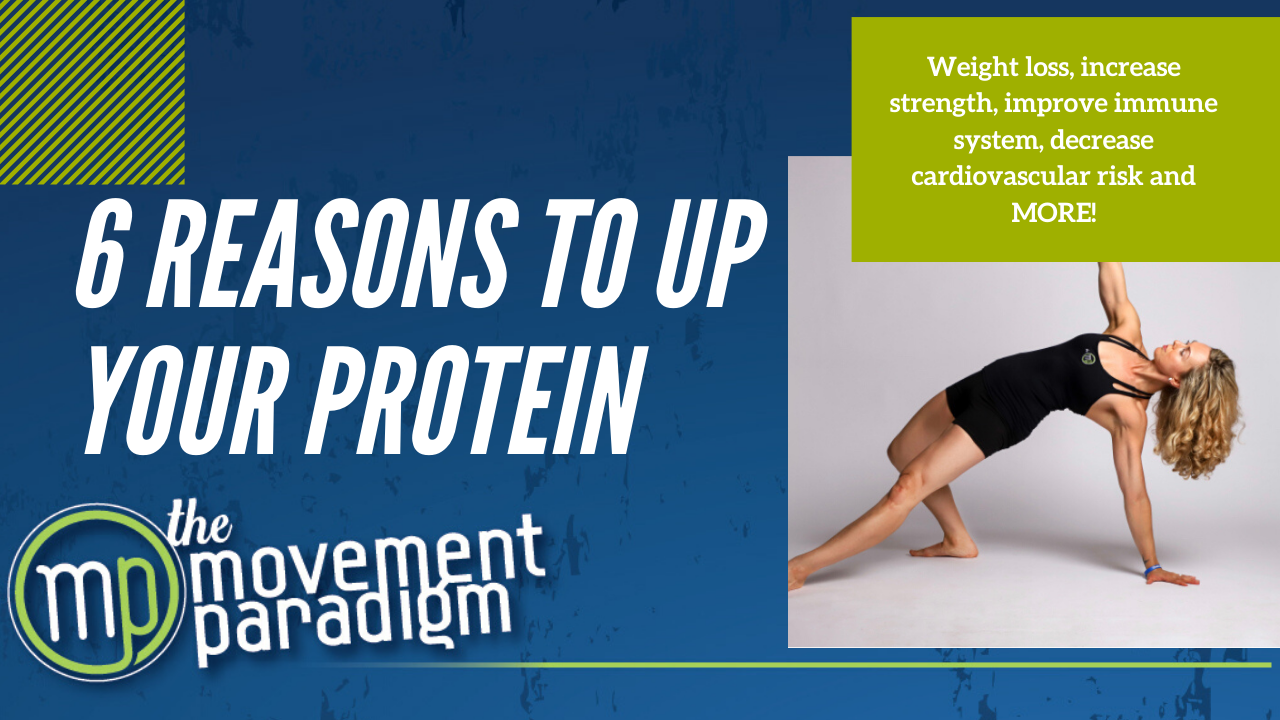Let’s discuss one of my favorite nutrients, protein. This can be a very controversial nutrient especially as it relates to animal-based versus plant-based protein. Not only does protein help build new cells, repair old cells, and help keep our muscles and bones strong, but it also keeps us satiated between meals to prevent us from overeating and having significant cravings. Your body needs 20 different amino acids to function properly. However, nine of those are essential amino acids, meaning that they are required from your diet. The amino acid is a building block of protein. This allows our body to function optimally especially as it relates to repair and recovery as well as immune health. The key sources of the amino acids are primarily your meat products like meat, poultry, eggs, and fish, as well as the plant-based protein, soy.
Now, let’s discuss six different ways that protein is so important for your body.
- Helps with weight loss and improves metabolic function
One of the key ways it does this is by suppressing the hormone ghrelin, which is produced in the stomach and secreted by the pancreas and the small intestine. It also boosts Peptide YY which is a hormone that makes you feel full. This can help with cravings, late-night snacking, and eating too much throughout the day. In addition to that, protein has a higher thermic effect of food which is 25 to 35 percent versus fats and carbs which is five to 15 percent, so that means that you’re burning more calories overall by eating more protein sources.
2. Increases muscle mass and strength
It does this in two ways. One is that it increases glucagon, a hormone produced by the pancreas, which is important for fat mobilization. The second is that it increases insulin-like growth factor 1 (IGF-1), which is an anabolic hormone that is necessary for muscle growth. Therefore, it is very important that if you are doing a strength training routine of any kind that you make sure that you’re eating enough protein. It’s also really important to make sure that if you are in weight-loss mode that you are consuming more protein because your protein needs are higher to preserve that lean body mass.
3. Improves bone health
Despite what some unwarranted research states, protein helps with improving the structural matrix of the bone, helps with increasing urinary calcium, increases your intestinal calcium absorption, as well as increases the IGF-1.
4. Lowers your cardiovascular risk
Not only can it lower blood pressure by reducing the systolic number, but it can also lower your LDL cholesterol and triglycerides. If you are at current risk for cardiometabolic risk factors, or you have a family history of heart disease, I would highly suggest that you incorporate protein into your diet.
5. Helps to heal our body
Protein is necessary to help fight bacterial and viral infections. It is a vital part of our immune system cells, for example, antibodies. We need protein to make antibodies. So, if you are lacking in protein you can feel weakness, fatigue, apathy, and have poor immunity.
6. Helps to heal your body after injury
Often times our protein needs are even higher after an injury to help with all the things I just mentioned. Remember, protein is the main building block of our tissues and organs. Even as we age and we develop things like sarcopenia, a loss of muscle mass; optimal protein intake coupled with physical activity, especially weight-bearing activity, is critical to prevent that.
Now you know all of the amazing benefits of protein. It can help with weight loss and fat mobilization, increasing muscle strength, helping your body recover from injury, helping your body prevent and recover from viral and bacterial infections, lowering your cardiovascular risk, and improving your immune system.
What is the appropriate amount and when should I eat protein?
For women, 20 to 30 grams of protein is recommended every few hours. For males, it is suggested to have 40 to 60 grams every few hours. Most people get about 15 percent of their calories coming from protein, but really, we need 25 to 30 percent. It is easy to think of it this way. At every meal and snack you’re having, pair it with a good high-quality source of protein. This means we are aiming for a full profile of nine essential amino acids. That’s primarily going to come from your animal proteins. I recommend hormone-free, grass-fed, lean meats. Soy is also another plant-based form that contains the essential amino acids. You can as a vegetarian or vegan consume enough protein, however you just need to plan extensively to make sure that you’re getting enough protein and not focusing so much on the carbohydrate sources.
So, I hope that was helpful for you. I do think it is such an important nutrient to think about as it relates to all of these aspects of health and there are so many misconceptions about it, so I wanted to make sure that I address some of the science. Hopefully, this will help you and your meal planning. I always say as it relates to your meals, use the KISS principle (keep it stupid simple). Consume a protein, a healthy fat, and a fiber source with every meal and snack.
If you need help on your journey to better health, contact [email protected] to schedule.
For more content, make sure to subscribe to my YouTube channel here.

